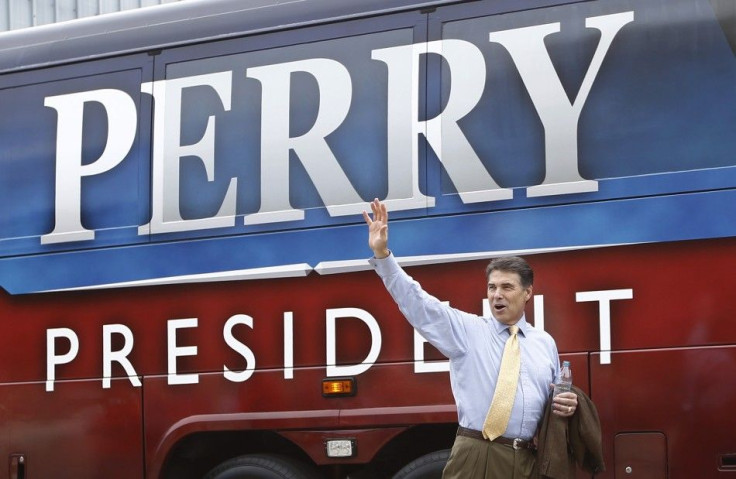Republicans Favor Perry, But Obama Still Leads Over GOP Nominees: Poll
ANALYSIS

There's good news and bad news in the latest Bloomberg Poll for Texas Gov. Rick Perry regarding his quest for the U.S. presidency in 2012.
The good news is Perry leads the Republican field of potential nominees. The bad news is that there are danger signs emerging concerning his ability to win support in the November 2012 general election.
Perry, a conservative, is the top choice of Republican voters and Republican-leaning Independents in the latest Bloomberg National Poll: Perry garnered 26 percent of the vote, while former Massachusetts Gov. Mitt Romney attracted 22 percent.
All other Republican candidates got less than 10 percent of the vote.
General Election: Perry Trails Obama
However, the news is not as good for Perry concerning his prospects for entering the White House.
In a hypothetical match-up versus President Obama, a Democrat, Obama leads Perry 49 percent to 40 percent in the poll's entire sample.
What's more, Perry's deficit versus Obama is about twice the deficit for Romney. Obama is ahead of Romney, 48 percent to 43 percent, in the poll's entire sample.
Perry also has high negatives from Americans unlikely to vote for a candidate expressing the skepticism he has voiced about the viability of Social Security, evolution, and whether humans contribute to climate change.
Science is an integral part of our culture, Danyelle Lowers, 27, a student at Kent State University in Kent, Ohio, who considers herself an independent voter, Bloomberg News reported Thursday. To have such a general disregard for the sciences is rather terrifying.
Further, among Republican voters and Republican-leaning Independents, men are more likely to vote for Perry and women are evenly-split between the two.
Perry also leads Romney among Tea Party faction supporters, 31 percent to 21 percent.
The Bloomberg poll was conducted Sept. 9 thru 12.
Political/Election Analysis: Two cogent points from the latest Bloomberg Poll, but first a qualifier.
Readers should keep in mind that the nation is 14 months away from the 2012 election, and it is a voting behavior axiom that A year is an eternity in politics. Translation: a lot can change, from a voter preference standpoint, between now and November 2012.
That said, the latest poll is another telltale sign of voter dissatisfaction with incumbents: a national-scene newcomer arrives from right field and he almost immediately becomes the frontrunner. Voters clearly are not ready to nominate an establishment candidate if that candidate cannot demonstrate an ability to propose innovative, viable ideas to break both the logjam in Washington and not conform to status-quo interest group politics.
Second, the poll also shows the strength of President Obama. Despite the U.S.'s high unemployment rate, no success courting Congressional Republicans to bipartisan initiatives, and liberal-base deterioration, Americans would still rather see Obama re-elected than hand the Oval Office to Perry or Romney.
Moreover, as the above suggests, if the short-term forces, primarily the U.S. economy, were not working against Obama, his advantage over the Republican nominee would be even larger.
© Copyright IBTimes 2025. All rights reserved.





















